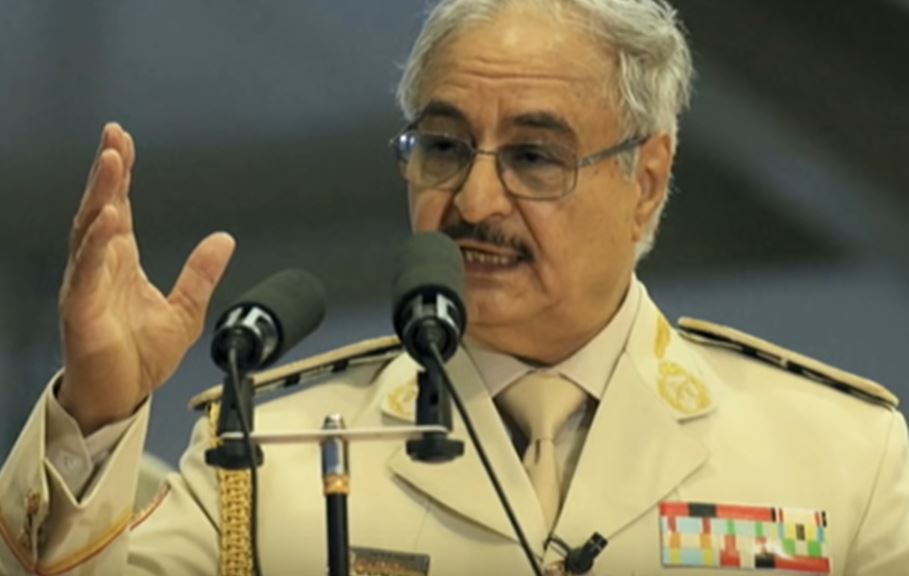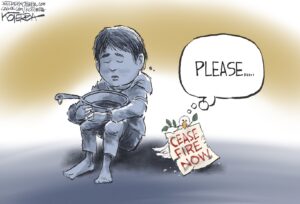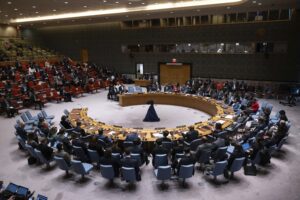Fighting Rages as Libya Force Pushes Toward Key Western City
The cease-fire further crumbles as militias loyal to commander Khalifa Hifter advance on Misrata in clashes with Tripoli government allies. Libya military commander Khalifa Hifter. (YouTube screenshot)
Libya military commander Khalifa Hifter. (YouTube screenshot)
CAIRO — Officials from Libya’s two rival governments said fighting erupted Sunday as the country’s east-based forces advanced toward the strategic western city of Misrata, further eroding a crumbling cease-fire agreement brokered earlier this month.
The clashes came just hours after the United Nations decried “continued blatant violations” of an arms embargo on Libya by several unspecified countries. The violations fly in the face of recent pledges to respect the embargo made by world powers at an international conference in Berlin last week.
Libya is divided between rival governments based in its east and west, each supported by various armed militias and foreign backers.
The weak but U.N.-recognized government is based in the capital, Tripoli, and led by Prime Minister Fayez Sarraj. It is backed by Turkey, and to a lesser degree Qatar and Italy. Rival forces based in the east and loyal to military commander Khalifa Hifter receive support from the United Arab Emirates and Egypt, as well as France and Russia.
Hifter’s forces were advancing some 120 kilometers (around 75 miles) east of Misrata, near the town of Abugrein, according to the media office of militias allied with the Tripoli government. It said clashes were still taking place in the outskirts of Abugrein.
A spokesman for forces allied with the Tripoli government, Mohamed Gnounou, said in a statement posted online that Hifter’s repeated violations made the cease-fire “useless.”
An official with Hifter’s forces said they have wrested control of two towns, Qaddaheya and Wadi Zamzam, on their way to Abugrein. The official spoke on condition of anonymity in line with regulations.
Ahmed al-Mesmari, a spokesman for Hifter’s forces, told a press conference that their offensive on Abugrein was a “limited, pre-emptive strike to achieve certain targets” after they received intelligence that the Tripoli-allied militias were preparing to attack in the area. He did not elaborate.
Misrata is Libya’s second largest city and home to militias who oppose Hifter and have been extremely important in Sarraj’s defense of the capital. Hifter’s forces have laid siege to Tripoli since last April.
Jalel Harchaoui, a Libya expert at The Netherlands Institute of International Relations, said Hifter’s swing toward Misrata was a tactic calculated to draw away the Misratan militias defending the capital toward their hometown. He said it had a “good chance of succeeding” and weakening the U.N.-supported government’s defenses in Tripoli as a result.
Hifter’s forces captured Sirte earlier this month, a major below to the Tripoli-based administration. Sirte is located about 370 kilometers (230 miles) east of Tripoli.
The nationwide truce, brokered by Russia and Turkey, marked the first break in fighting in months, but there have been repeated violations.
Also on Sunday, the U.N. support mission in Libya, UNSMIL, said two civilians were wounded when two Grad missiles hit Tripoli’s only functioning airport, Mitiga. The airport was shut down earlier this month following a similar attack, with Hifter’s forces saying they would impose a no-fly zone over the terminals’ area.
Late Saturday, the UNSMIL released a statement saying “several (countries) who participated in the Berlin Conference” have been violating the arms embargo.
“Over the last ten days, numerous cargo and other flights have been observed landing at Libyan airports in the western and eastern parts of the country providing the parties with advanced weapons, armored vehicles, advisers and fighters,” the U.N. statement said.
Turkey has sent troops in support of the Tripoli government but the Turkish President Recep Tayyip Erdogan reiterated that the deployment consists of “trainers and educators” and not a combat force.
The Britain-based Syrian Observatory for Human Rights, which tracks Syria’s civil war, says hundreds of Turkey-backed Syrian rebels have arrived in Libya and joined the fighting on the side of the Tripoli-based government.
U.S. officials said Hifter’s recent push came with the aid of hundreds of Russian mercenaries. U.N. experts said in a report earlier this month that Sudanese armed groups from the Darfur region also joined the fighting recently on both sides.
The Berlin summit participants were from Algeria, China, Egypt, France, Germany, Italy, Russia, Turkey, Republic of Congo, United Arab Emirates, United Kingdom and United States plus representatives of the United Nations, African Union, European Union and Arab League.
The peace push followed a surge in Hifter’s offensive against Tripoli, which threatened to plunge Libya into chaos rivaling the 2011 conflict that ousted and killed longtime dictator Moammar Gadhafi.
Earlier this month, powerful tribal groups loyal to Hifter also seized several large oil export terminals along the eastern coast as well as southern oil fields. The closure of Libya’s major oil fields and production facilities has resulted in losses of more than $255 million in the six-day period ending Jan. 23, the country’s national oil company said Saturday.
Your support matters…Independent journalism is under threat and overshadowed by heavily funded mainstream media.
You can help level the playing field. Become a member.
Your tax-deductible contribution keeps us digging beneath the headlines to give you thought-provoking, investigative reporting and analysis that unearths what's really happening- without compromise.
Give today to support our courageous, independent journalists.






You need to be a supporter to comment.
There are currently no responses to this article.
Be the first to respond.